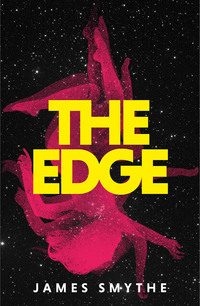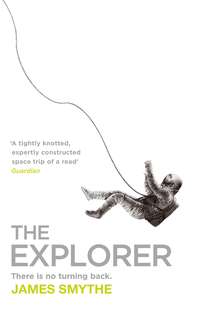
Полная версия
The Echo
‘Nothing to it,’ he says. The others line up one by one, and they all act as if it’s nothing, but I see in their hands the mild tremble of fear at the injection itself; or, maybe, at the thought of being asleep and not being in control. I never used to drink, for that loss; I never used to take painkillers, for the same. Tobi goes first, then Lennox, then Wallace, and then Inna turns to me. ‘You next,’ she says.
‘One second,’ I say, as she readies the hypo. I pull myself to the cockpit and open a connection to Tomas. ‘Can you hear me?’ I ask him.
‘What is it?’ Tomas sounds annoyed at the sound of my voice. I know how busy he must be. I speak quietly, and turn away from the rest of the crew. I don’t want anybody to see that I’m worried.
‘Is everything okay?’
‘It’s fine. Why would it be anything other than okay?’
‘I just wanted to check.’
‘You think that I would let the launch happen if everything wasn’t okay?’
‘No,’ I say.
‘I have work to do, Mira.’ And then he’s gone. I turn back to Inna, who’s waiting. ‘Let me get into the bed,’ I say. ‘Do it there.’ I am next to the central controls on one side, with Inna on the other.
‘You can’t,’ she says. ‘You have to do me after I’ve done you.’ I nod and sit on the edge of the bed, unbuttoning the top of my shirt, and I pull it down to show the part she needs. She leans in: I feel the press of the needle. Like a bore, followed by the break of the skin, and the liquid. That’s the worst part: feeling it rushing inside of you, something where it should not be, mingling. It hurts for a second, nothing more. ‘It’ll only be a couple of minutes before you feel it,’ she says, and she pulls her top to one side and exposes the tattoo again. I can see more of it: the head of a bird, blue and yellow, eyes wide, mouth open. An eagle’s beak. It seems to run lower, towards her chest itself. She puts the capsule in and then hands me the hypo, and points with her finger to where I should place the nib.
‘Ready?’ I ask.
‘Of course,’ she says. The hypo rests against the peak of the bird’s head. I press the button and she barely reacts; I pull it away. She folds her top back up. ‘Now,’ she says, ‘time for sleep.’ She swings her body round into the bed and I hear the hiss of the magnets. ‘They lower the doors for us?’ she asks.
‘They will, but you can do it yourself if you want.’ I glance over at the others, their frontages still up. ‘Sleep well, everybody,’ I say. They murmur; they’re already under. It hits you like you don’t know it’s coming, and you’re suddenly elsewhere, in total darkness. It’s brutal, how fast it is. Inna lies back.
‘See you when we wake up,’ she says. She reaches for the lid; her touch alone makes it descend, bringing it down around her. The glass darkens as it lowers. I flatten myself against the bed as well, and I fasten the magnets, and I try to stay still, because I am still not used to this; the feeling of never being flat, of never being orientated one way over the other. I rest my head on the bed, snug inside the plastic form that’s been moulded around our individual physical shapes. I wait until a click comes over the intercom, and I hear Tomas’ voice.
‘This is the first milestone on the road to the stars,’ Tomas says. ‘Beds closing in five. Four.’ He finishes the countdown and the glass slides down and seals me in. Enough air to breathe, to sustain, that’s the deal. When you sleep you naturally need less. Your body rights itself, puts itself into a state of optimum intake. It aids the depth of your sleep as well, having less air. I shut my eyes and wait for sleep to take me. I know that it cannot be long now.
I hear the engines kick in, and the rumble that they send throughout the entire ship. For that second, it feels like an explosion. I hear the joining door being retracted, and the order that it be so, and I hear Tomas’ voice over the intercom telling the ground crew to prepare for launch. I keep my eyes shut and think about the path we’re going to take, and how the launch will look. We’ve run so many simulations – and a simulation was how we knew to launch from the NISS in the first place, how the money saved on building an extension here to do it was proven to be the right choice by another simulation – and I can see them all running at the same time.
When I used to fly in airplanes I would shut my eyes for a second as we took off and picture the plane exploding, bursting into flame. They say that if a plane is going to crash, it’s statistically most likely to happen as it takes off. I figured that if I got past that I was pretty safe. I imagine this ship exploding. I imagine the pieces floating all around me in space. I imagine me floating amongst them.
Tomas does the other checks, his voice talking through every stage, and I start to wonder why I’m not asleep yet. I should be, by now. This is crucial. Sometimes people need a few minutes to really let the sedative sink in, I remind myself. Sometimes the body’s natural adrenalin, the endorphins, they need longer to be counteracted and swallowed by the sleep. But then: now I am worrying that I am not asleep. In my life I have insomnia, I suppose, of a sort: when pressure mounts and the following day carries any sort of importance, I will worry all night, worry that I am not going to achieve the required amount of sleep to function at an optimum the following day. This is a self-fulfilling prophecy, as the worry is then the thing that conspires to keep me awake, rolling around in my head in circular patterns that never stop looping in on themselves. Only when I have given up all hope do I stand a chance of actually falling asleep: when I have managed to pass that point, to realize that there is nothing I can do now, and that the day I was so worried about is likely ruined. It is a hindrance; a horror. I sleep so badly, because almost every day carries that pressure. Tablets do not help, not really: all they do is render me more tired than I would ordinarily be when I awake. Eventually nature takes over and I sleep: but it is fitful, and it is not what I want. This injection: this is to be my salvation for this leg of the journey. After this, I will worry about it as and when.
I cannot see a clock from here. There’s nothing. That’s an oversight, and I should have thought about that. There are no microphones in the beds either, another oversight. It’s to protect the seal: the fewer holes there are, the less chance of there being a crack. The pilot on the Ishiguro died before they even woke up, probably because of a gap in the seal, something like that. So we were cautious. It’ll settle in. I’ll sleep soon, because this is medically controlled. This is something I cannot avoid. On occasions, when I have been at my most desperate for sleep, I have taken painkillers: something strong enough to dull everything else, to remove my faculties from worrying about the sleep itself. This is like a better version of them: unavoidable, inevitable.
‘Launch crew prepare,’ I hear through the ship. You can’t open the beds from the inside once they’ve been sealed. If you could, you could accidentally do it, and there’s nothing worse than that thought. The speeds that the ship will reach as it pushes off from the NISS – free of the trappings of any real gravitational pull, free of the resistance offered by an atmosphere – are so ridiculously powerful that they could – or would – damage the human body. Our bones, our bodies, they are not strong enough. The beds are pressure sealed to provide an environment that the body can cope with. They create their own pressure level inside them; protect the crew from the g forces. It’s another of mine and Tomas’ innovations. Another way that we are making this expedition work. If any of the crew were to be out of their beds – and the controlled environment created therein – they would likely die. Their body would be found pulverized, as if it had been beaten to death. But I am not loose. I am in here, awake. I don’t know if this is dangerous. I cannot think about how dangerous this is. I shout.
‘Help,’ I shout, ‘I am not asleep yet!’ I call Inna’s name, hoping that I’ll see her descend and open my bed, and inject me again, triple-strength, able to level me to slumber while this flight happens. I was always scared of flying as well: of seeing the Earth get smaller underneath me. Not like I will see it from space, that doesn’t faze me, because you can see everything in one go: more the sensation of suddenly glimpsing people as specks, and cars as ants, and then everything smaller and smaller, houses like dust, and then whole towns. But Inna doesn’t come, and everything is dark, soundtracked by the rumble of the engines proper: through everything, right through the hull. Everything underneath me feels like vibration, nothing else. I feel my bones rattle, and my teeth in my jaw. ‘I should be asleep!’ I shout, but my voice dulls itself against the inside of my bed, and against the growling of the ship, and against the paralytic. My words slurred.
The engines fire for launch in three phases. First phase is a warm-up, bringing the temperature of the engines up to the necessary point. The second phase – the phase that I feel kick in through the rumble, like a foot on a gas pedal while the handbrake remains pulled on – adds the injectant and coolant into the burner, readying to add it to the engines themselves. ‘Please,’ I hear myself say – an echo through the rumble – and then the third phase.
‘Countdown time,’ Tomas says. He goes through the numbers, twenty to one. I brace myself. I don’t know what will happen. Why did we have to be asleep for this part of the launch? Because it made sense. Because we were liable to panic. Because the vibrations of the ship would be so violent that we weren’t to struggle against them. I have always hated sleep. Not been afraid of it, that’s wrong, but felt it a waste. Tomas slept less than I did, and he would play pranks on me as I overslept, as I lazed about; but it’s more than that. He would have achieved so much by the time that I woke up. He would have done things. Found things. Now, he’s meant to be awake and guiding me, and I’m meant to be asleep, and letting him, but I’m not. I want to be. I don’t want to die, here. I don’t want to be shaken apart. I tell myself not to struggle. I have the self-control to do this, I tell myself. I say it aloud; or I think that I do.
The engines accelerate to a point where we break a faster speed than any man-made machine before. In the glory days of space travel, when we were still trying, the shuttles hit speeds of nearly twenty thousand miles per hour, when they were in orbit. We’re doubling that; more, even, when we reach maximum acceleration. Tripling it. And then we will coast, using that momentum, slowing to maintain that speed only, holding it as long and as far as we can. That’s the rumble. Every part of this ship is made from materials built to withstand that pressure, joists and fixtures made with composite materials that didn’t even exist a decade ago. The metal of the hull is our own: we bought the man who designed it, all of his patents, all of his designs. I think of this, of the blueprints now: flashing through my mind. His metal shakes like everything else, though. No amount of stress testing can prevent it feeling as if it is falling apart. We didn’t tell the crew that. We told them that every possibility had been accounted for. We lied, because how else do you get people to agree to something like this?
‘One,’ Tomas says, or I think it’s Tomas. Maybe I’ve been counting down with him, speaking at the same time, my voice along with his. The launch happens, and the craft shakes and lurches, and I hit my head, over and over, on the hard plastic part of the bed that is moulded to me instead of being a pillow, practicality not comfort, and I think that that’s yet another oversight. We should have had a pillow; then, maybe my head wouldn’t hit this so hard.
Everything gives way to darkness. This isn’t sleep: this is my body giving up.
Man wasn’t meant to see this. Man was meant to stay on the ground. My mother said that she believed in angels, and maybe she was right. What are the implications of travelling as fast as we’re suggesting? That’s what I asked Tomas. I said, Really, the actual implications. Do we know? We put carcasses in the centrifuge, reaching g forces equivalent to this, and we watched them quiver and be pulverized. So I said, Are we sure that this is the right thing? What are the implications? He said, The implications are that you’ll have travelled faster than anybody before you. You know what I mean. He sighed. It could break you. You’ll feel it, whatever happens. It’ll pull every part of you. So we make them sleep, I suggested, because then they’ll not know. They’ll wake up feeling like they’ve been in a fight, and not knowing who hit them. Oh, they’ll know, he said.
I open my eyes, like instinct, but it hurts. Everything’s glowing white, I would swear: even though the lights are off and my glass is dimmed, it glows.
White, white, white. Almost painful, it’s so bright.
I try and open them again, to see, and it feels like they’re being pressed on, forced and pushed down, and everything’s white when it should be black. My body can’t move, I discover. I wish I was like the others, safe and asleep. They don’t know what their bodies are going through. I can feel the bones in my face – the very essence of my skull, everything, underneath the skin, underneath all of me, every little part – and it feels as if it is being pulled apart.
I am in hell.
3
When I next open my eyes, it’s quiet. The rumble is gone, and it’s dark. My eyes hurt: all I can really see, apart from the darkness, are after-images of flashing white, as if I’ve been staring too closely at the sun. The beds hiss open, including mine. I hear Tomas’ voice.
‘Time to wake up, rise and shine,’ he says. The pressure of the sealed beds is meant to keep us asleep until the time the beds open, and the lights are turned on. The blackness around the sunspots in my eyes goes white as well, brighter than the rest, and I can’t see. I shut my eyes but the glow comes through the eyelids, so I try to turn my head. The beds are fully open. I hear voices.
‘Wow,’ says Lennox. ‘Holy shit, that hurts.’ He’s floating upwards, arching his back. ‘Oh my word.’ I hear something click.
‘What was that?’ asks Tobi, and Lennox laughs.
‘My bloody back,’ he says. ‘That noise was my bloody back.’
‘Move slowly, all of you,’ Inna says. ‘Stretch, sure, but be gentle with it.’
‘You never warned us about this,’ Wallace says. ‘Jesus Christ, I feel like I’ve been in a bar fight.’ The others laugh. ‘Tomas, where are we?’ There’s a slight pause as the transmission is sent back to Tomas, on Earth still. I wonder if he’s slept yet.
‘You’re in space,’ Tomas eventually says, his voice coming through a slight crackle. (Only a few seconds’ wait. That will get longer, I know.) The crew laugh again, and then coo. This is realized: we’re out here, wherever here is. ‘Call up the maps, that’ll show your position.’
‘How fast are we going?’
Another wait, then Tomas answers. ‘Forty-six,’ he says. ‘And that’s locked in. Engines resting.’ The delay here is really nothing. It’ll get worse the further we go. And it’s crystal clear. Used to be that, this far out, you’d be speaking through the hiss, hoping the message would get through, biting your nails. Another piece of technology that made all of this possible. ‘Is everybody awake, everybody okay?’ None of them say anything, but their silence is enough. I still haven’t opened my eyes, but I can feel theirs on me: wondering why I’m lying as I am, stretched out and strapped in still. They stay silent. I can hear them wondering. Tomas guesses. ‘Mira, are you up? Are you awake?’
‘No,’ I say. ‘Not yet.’ I try my eyes again, and they work – I can see the blurred shapes of the crew past the spots – so I swing my legs out, haul my body up. It feels worse than I ever imagined. I’ve never been a fighter. I never knew what this might feel like, when the analogy was presented. I could only guess.
‘Up and at ’em,’ Tomas says. ‘I need you to start running tests. Begin with the batteries. We need to make sure they’re recharging properly for when we need to decelerate.’ Everything that isn’t the engine here is run off a battery. We took very few things from the previous space-flight attempts – the previous and failed attempts, by the South Asian Space Agency in the twenties, the Ishiguro not long after them – but we took their battery systems. Piezoelectric energy. It converts the vibrations of the ship into power. The rumble that we went through during launch, the slight shudder of the engines through the hull, even the repercussions of us being inside here and interacting with the ship herself, it all ends up as energy. It’s what keeps the lights on, the ship warm, and us alive. In a worst-case scenario, we’ve even posited that it could get us home, powering the tiny boosters that we would otherwise use as stabilizers. Worst-case. But the power is therefore precious. If they had to – we’re adrift, the fuel fails, something – the batteries are what would keep us alive. Though, they burn power a lot faster than they generate it. When we decelerate, when we’re reaching the anomaly, we need to sleep again: the pressure change, all over again. I cannot even think about that now. ‘I’ll give you a minute,’ Tomas says.
I feel a hand on my arm, and a face close to mine. ‘Are you okay?’ Inna asks. Her breath smells of mint, already, as if this is something she has taken care of before anything else. I dread to think about mine. That is such a small thing.
‘I’m okay,’ I say. ‘Something went wrong, with the injection.’
‘What do you mean?’
‘I didn’t sleep. I was awake through the launch.’
She squeezes my arm. Her nails: I can feel them on my skin, pressing down. ‘That’s a common dream, I think. When people are sedated, they manifest dreams of what they feel that they’re missing. It’s really a very common thing.’
‘I was awake,’ I protest, ‘and then I passed out. I hit my head.’
‘Well, you seem okay now,’ she says. She runs her hand behind my skull, to feel for a lump, maybe. She doesn’t believe me. It doesn’t matter. ‘Open your eyes for me,’ she says.
‘It’s too bright,’ I tell her.
‘Let me look.’ I feel her hand on my forehead, shielding me from the light. She stands in front of me, casting me in shadow. I open my eyes, and I can see her, past the after-image. She’s close, peering at me. ‘They’re fine,’ she says. I can feel her breath on my face, somehow both cool and warm. ‘Pupils dilated, but that’s okay. They’ll settle. You’re fine,’ she says. She steps back, and I blink. Only the spots remain, but everything else starts to slip into focus. The crew are all staring at me.
‘I’m okay,’ I say. They are professional, as am I. They know that what we need to do now is worry about the rest of the mission. This is a mission, where the Ishiguro was, what, a jaunt? And I am a scientist, not an action hero. In the old days, there used to be rules: astronauts had to conform to certain physical and mental presets in order to be able to undertake their missions. They had to be psychologically proofed to within an inch of their minds, ready and willing and able to take on whatever challenges would be hurled at them. And when Tomas and I were planning this, we said that our crew would adhere to those rules. You look at the Ishiguro, at what went wrong, and they started with their crew. Faces that were too pretty, faces made for television. People with inadequate training – six months, only, where we decided that eighteen was the minimum. And a journalist up there with them, purely so that they could secure more funding. The day that they went, they found out that his wife had killed herself, and still they let him go! It was madness. Tomas was adamant: that sort of thing wouldn’t be happening on our voyage. On ours, our crew would be right for the task at hand, multi-disciplinary. The correct people, above all else. When we spoke about it, in my mind, Tomas was the one up here. I assumed, I think, because maybe he seemed to win more coin tosses than I did. But the rest of the crew, in my mind, were to be solid and able. If something went wrong – god forbid, if they lost a pilot, for example, due to whatever – anybody else in the crew could step in and take their place. All of us are expendable, to some extent. I know the research that needs to be done when we reach the anomaly, but if I were to die, Tomas would be able to talk somebody else through it.
They all watch me push away from the bed, even as I squint through the brightness. I flail in the lack of gravity, somehow even less graceful than I was on NISS. Inna takes my hand and pulls me to one side, then puts it onto one of the rails that runs along the side of the room. She folds my fingers over it for me, and then puts her own over mine, putting pressure on it. The confidence of her, telling me that all of this will be all right.
‘Hold on,’ she says. I clutch onto the rail, and look at my hand, to focus myself. I can’t tell if the white is my knuckles or the residue of the spots in my eyes, but it distracts me and I let go. I haven’t got control, and I lose my breathing. I feel a hand on my shoulder: Hikaru, steadying me. He smiles.
‘Dr Hyvönen,’ he says. ‘You’re okay. It’s just a bit of residual whatever. Can’t have you ruined before we’ve even begun.’ I cling to him, and I try to make the feeling in my gut die down; I try to think of anything but how easy it would be to spin here, and how tired I am, and the whiteness behind my eyes, which doesn’t seem to leaving me no matter how many times I blink, no matter how many times I shut my lids and try to picture nothing but darkness.
Hikaru and Tobi prepare the cockpit. They sit down and they check the pathfinder, the life-support systems, the drag. One of them is to stay here at all times, to ensure that nothing changes suddenly. We are to travel to, and then stop outside, the anomaly, as best we understand it, and take measurements and readings, conduct all of our tests from there. It takes a long time to stop this ship as well: and the force to do it is just as strong as the force it took to get it going. We have to have our wits about us. As they are preparing, they change the cockpit screens to show us behind the ship; and they call us over, both of them smiling. There is the Earth: spinning in the distance, the size of the smallest coin, and getting smaller and smaller as we watch it, as we are moving away from it so quickly that it would be unbelievable if Tomas and I hadn’t designed it to be so.
I feel sick, unbelievably sick. Inna takes me to one side and clips me to the safety bars, and she gives me pills to swallow down that will settle my stomach, she says. I know what they do: they settle nothing. Instead, they suppress the brain’s ability to feel the stomach churning. I don’t say anything, because this is her job. I have no desire to undermine her. The rest of the crew start their checks: Tobi and Hikaru running through every possible fault-point, calling out features of the craft and running analysis on those systems, synchronizing the computers with the ship itself, checking the batteries, reporting back to Tomas to ensure parity of results. Wallace goes off down the corridor, towards the engine rooms, to check efficiency there, to ensure that all readings there are correct; Inna leaves me, patting me on the knee, and then goes round one by one, looking at the crew’s eyes, to make sure that there are no burst blood vessels (or, at least, that’s what she says, as she looks for signs of stroke or aneurysm); and when he’s been checked and okayed, Lennox pulls himself in front of me, smiling.
‘You want me to start doing something?’ he asks. His accent is bizarre. France by way of Jamaica, delivered with the drive of having studied in London. A proper mélange of an accent. We are kindred spirits in that, if nothing else. ‘I’ll call up exactly where we are.’
‘We know where we are,’ I say. The computer does all of that for us. We’re useless until we get to the anomaly itself.
‘I can set us up. Set your workstation up. Start pinging the anomaly.’









